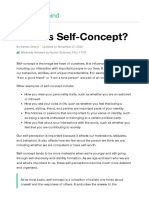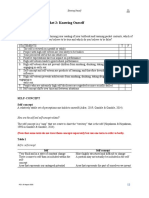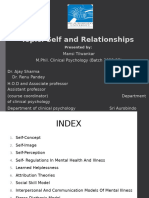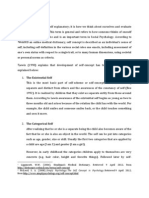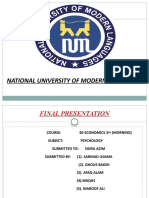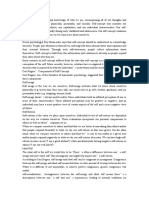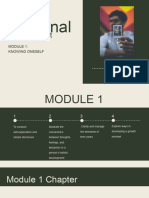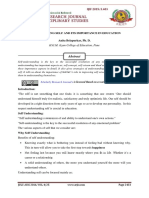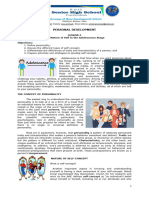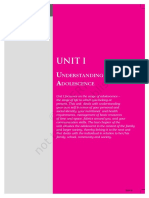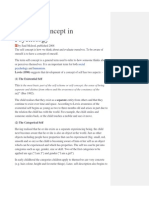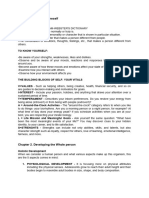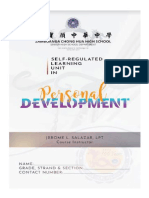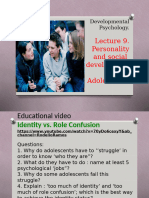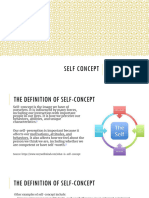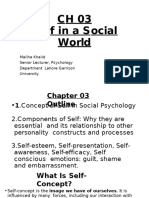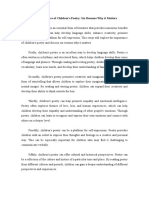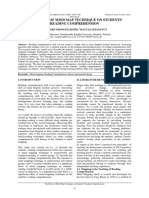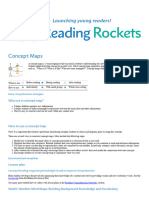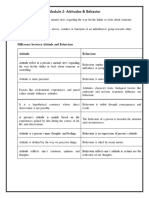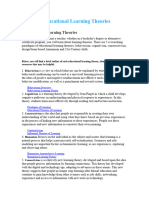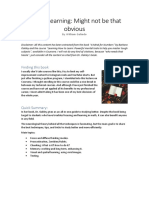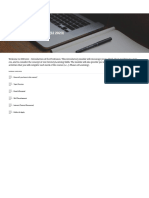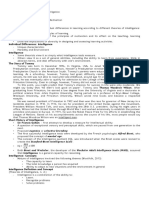MODULE IN Self Concept
MODULE IN Self Concept
Uploaded by
Mamaclay ElymarCopyright:
Available Formats
MODULE IN Self Concept
MODULE IN Self Concept
Uploaded by
Mamaclay ElymarOriginal Title
Copyright
Available Formats
Share this document
Did you find this document useful?
Is this content inappropriate?
Copyright:
Available Formats
MODULE IN Self Concept
MODULE IN Self Concept
Uploaded by
Mamaclay ElymarCopyright:
Available Formats
MODULE IN NCM 103
FUNDAMENTALS OF NURSING
OBJECTIVES:
At the end of the module, the student will be able to;
1. Summarizes the development of self concept and self esteem.
2. Identify dimension of self concept
3. Describe formation of self concept
4. Categorize the components of self concept
5. Discuss the different factors that affects self concept.
6. Describe the essential aspects of assessing role relationships.
7. Identify nursing diagnoses related to altered self concept.
8. Describe nursing interventions designed to achieve identified outcomes for clients qith
altered self concept
9. Describe ways to enhance client’s self esteem
Self-concept is generally thought of as our individual perceptions of our behavior, abilities, and
unique characteristics—a mental picture of who you are as a person. 1 For example, beliefs such
as "I am a good friend" or "I am a kind person" are part of an overall self-concept.
Self-concept tends to be more malleable when people are younger and still going through the
process of self-discovery and identity formation. As people age, self-perceptions become much
more detailed and organized as people form a better idea of who they are and what is important
to them.
At its most basic, self-concept is a collection of beliefs one holds about oneself and the responses of
others. It embodies the answer to the question "Who am I?"
Humanist psychologist, Carl Rogers believed that there were three different parts of self-concept:
Self-image, or how you see yourself. Each individual's self-image is a mixture of
different attributes including our physical characteristics, personality traits, and social
roles. Self-image doesn't necessarily coincide with reality. Some people might have an
inflated self-image of themselves, while others may perceive or exaggerate the flaws and
weaknesses that others don't see.
MMF [Type text] Page 1
Self-esteem, or how much you value yourself. A number of factors can impact self-
esteem, including how we compare ourselves to others and how others respond to us.
When people respond positively to our behavior, we are more likely to develop
positive self-esteem. When we compare ourselves to others and find ourselves lacking, it
can have a negative impact on our self-esteem.
Ideal self, or how you wish you could be. In many cases, the way we see ourselves and
how we would like to see ourselves do not quite match up.4
Characteristics of Self-Concept
As a brief review, self-concept is the perspective we have on who we are. Each of us
has a unique self-concept, different from the self-concept of others and from their
concept of us.
However, there are some characteristics that all of our self-concepts have in common.
Self-concept:
1. Displays uniquely with each person.
2. Vary from very positive to very negative.
3. Carries emotional, intellectual, and functional dimensions.
4. Changes with the context.
5. Changes over time.
6. Influence the individual’s life (Delmar Learning, n.d.)
Dimensions/components of Self-Concept
Different dimensions may constitute different kinds of self-concept; for example, the
dimensions that create “academic self-efficacy” will not have as much overlap with
“social self-efficacy.”
There are some overarching dimensions that researchers understand with the self-
concept puzzle. These dimensions include:
Self-esteem
Self-worth
Self-image (physical)
Ideal self
Identities or roles (social)
Personal traits and qualities (Elliot, 1984; Gecas, 1982)
MMF [Type text] Page 2
The Development Stages of Self-Concept
Self-concept develops and changes throughout the lifespan, but it is most in flux
during the early years. Early childhood is a ripe time for young humans to perceive
themselves in the world.
The Formation of Self-Concept During Early Childhood
There are three general stages of self-concept development during early childhood:
1. Stage 1: 0 to 2 years-old
a. Babies need consistent, loving relationships to develop a positive sense of
self.
b. Babies form preferences that align with their innate sense of self.
c. Toddlers feel secure with gentle but firm limits
d. At age two, language skill develops and toddlers have a sense of “me.”
2. Stage 2: 3 to 4 years-old
a. Three and four-year-olds begin to see themselves as separate and unique
individuals.
b. Their self-images tend to be descriptive rather than prescriptive or
judgmental.
c. Preschoolers are increasingly independent and curious about what they can
do.
3. Stage 3: 5 to 6 years-old
a. They are transitioning from the “me” stage to the “us” stage, where they are
more aware of the needs and interests of the larger group.
b. Kindergarteners can use their words to communicate their wants, needs, and
feelings.
c. Five and six-year-olds can use even more advanced language to help define
themselves within the context of the group (Miller, Church, & Poole, n.d.).
Self-Concept in Middle Childhood
During middle childhood (about 7 to 11 years old), children are beginning to develop
a sense of their social selves and figuring out how they fit in with everyone else. They
MMF [Type text] Page 3
reference social groups and make social comparisons more often, and begin to think
about how others see them.
Other characteristics of their self-concept at this stage include:
More balanced, less all-or-none descriptions
Development of the ideal and real self
Descriptions of the self by competencies instead of specific behaviors
Development of a personal sense of self (Berk, 2004)
Culture begins to play a big role at this stage, but we’ll talk more about that later.
The Development of Self-Concept in Adolescence
Adolescence is where the development of one’s self-concept really explodes.
This is the stage in which individuals (about age 12-18) play with their sense of self,
including a time when they experiment with their identity, compare themselves with
others, and develop the basis of a self-concept that may stay with them the rest of their
life.
During this period, adolescents are prone to greater self-consciousness and
susceptibility to the influence of their peers and chemical changes happening in the
brain (Sebastian, Burnett, & Blakemore, 2008).
They enjoy greater freedom and independence, engage in increasingly competitive
activities, compare themselves with their peers, and can value (even over-value) the
perspective of others (Manning, 2007).
In adolescence, there are two important factors that influence self-concept and self-
worth:
1. Success in areas in which the adolescent desires success
2. Approval from significant people in the adolescent’s life (Manning, 2007).
When students have a healthy sense of self-worth and self-esteem, they contribute to a
greater self-concept.
MMF [Type text] Page 4
FACTORS THAT AFFECT SELF CONCEPT
1. Stage of development
2. Family and culture
3. Stressors
4. Resources
5. History of success and failure
6. Illness
Stressors affecting Self concept
1. Identity stressors
2. Body image stressors
3. Role stressors
4. Self esteem stressors
NURSING MANAGEMENT:
Assessment interview for SELF CONCEPT:
How would you describe your personal characteristics?
How do you see yourself as a person?
How do others describe you as a person
What do you like about yourself?
What do you do well?
What are your personal strength, talents, and abilities?
What would you change about yourself if you could?
How do you feel when you think someone does not like you?
Is there any part of your body you would like to change?
Do you feel different or inferior to others?
How do you feel about your appearance?
How have significant others in your life reacted to changes in your body?
Assessment interview for SELF ESTEEM:
Are you satisfied with your life?
How do you feel about yourself?
Are you accomplishing what you want?
What goals in life are important to you?
Diagnoses:
Disturbed body image
Ineffective role performance
Chronic low self esteem or risk for
Disturbed personal identity/risk for
Anxiety related to changed physical appearance
Ineffective e coping with role change related to death of spouse
Grieving or complicated grieving related to physical appearance
Hopelessness
Parental role conflict
Readiness for enhanced self concept
Disturbed sleep pattern
MMF [Type text] Page 5
Social isolation
Spiritual distress
Activity: Make an assessment of yourself answering the question :WHO AM I?”. This is to test
how well do you know yourself. (guidelines: assessment interview questions).
As future nurses ,how does Self-Concept affect Interpersonal
Communication/relationship?
Resources: Kozier & Erb’s Fundamentals of Nursing, 10th ed.
https://www.verywellmind.com/what-is-self-concept-2795865
https://positivepsychology.com/self-concept/
https://www.thoughtco.com/self-concept-psychology-4176368
MMF [Type text] Page 6
You might also like
- Kendra CherryDocument4 pagesKendra CherrymartingolicruzNo ratings yet
- Self ConceptDocument35 pagesSelf ConceptKirtesh Savaliya100% (1)
- What Is Self ConceptDocument8 pagesWhat Is Self Conceptkmadhu21No ratings yet
- UTS Module SY 2020-2021Document91 pagesUTS Module SY 2020-2021Desiree Inoferio Adanza100% (1)
- Self ConceptDocument12 pagesSelf ConceptRanjana YadavNo ratings yet
- Learning Packet 2: Knowing Oneself: PretestDocument20 pagesLearning Packet 2: Knowing Oneself: PretestJeiro O. SombreroNo ratings yet
- Self and RelationshipsDocument59 pagesSelf and Relationshipsmansi123tilwankarNo ratings yet
- CFLM 412Document93 pagesCFLM 412Ree Ann AdlawanNo ratings yet
- Self ConceptDocument9 pagesSelf ConcepthkhnNo ratings yet
- National University of Modern LanguagesDocument24 pagesNational University of Modern LanguagesJawad AzizNo ratings yet
- Personal Development Module 1 EditedDocument20 pagesPersonal Development Module 1 EditedAsh dumpNo ratings yet
- MIDTERM USELF LESSON 1. Physical Self The Sun in Darkness 1Document55 pagesMIDTERM USELF LESSON 1. Physical Self The Sun in Darkness 1ronanNo ratings yet
- Final Self ConceptDocument30 pagesFinal Self Conceptamaninder71100% (1)
- CH 17Document24 pagesCH 17BhupendraNo ratings yet
- SELF-ESTEEM FOR WOMEN: Practical Strategies for Overcoming Insecurities, Boosting Confidence, and Loving Yourself (2023 Guide for Beginners)From EverandSELF-ESTEEM FOR WOMEN: Practical Strategies for Overcoming Insecurities, Boosting Confidence, and Loving Yourself (2023 Guide for Beginners)No ratings yet
- Understanding The SelfDocument6 pagesUnderstanding The Selfcarabbacanleyco10No ratings yet
- PsychologyDocument3 pagesPsychologyPakeeza SafeerNo ratings yet
- Unit - 3 Self Perception & Self ConceptDocument38 pagesUnit - 3 Self Perception & Self Conceptzainishbashir9No ratings yet
- PerdevDocument5 pagesPerdevStephanie Caniban100% (1)
- Personal Development: Department of EducationDocument10 pagesPersonal Development: Department of EducationRenji ZabimaruNo ratings yet
- 3 Components of Self ConceptDocument3 pages3 Components of Self ConceptQueenie Carale100% (2)
- Understanding The Self and Identity in EnglishDocument22 pagesUnderstanding The Self and Identity in EnglishLea Amor Martinez EshedoNo ratings yet
- Perdev1 Reviewer MidtermDocument15 pagesPerdev1 Reviewer MidtermAlyanna ManaloNo ratings yet
- Personal DevelopmentDocument62 pagesPersonal DevelopmentArlynn Lontoc De RamosNo ratings yet
- Perdev RreviewerDocument13 pagesPerdev RreviewerGracia Mae GaciasNo ratings yet
- Module 1.1 Self-Awareness (Synchronous)Document38 pagesModule 1.1 Self-Awareness (Synchronous)ziasantiago2008No ratings yet
- Learning Module Personal Development: Senior High School DepartmentDocument178 pagesLearning Module Personal Development: Senior High School DepartmentMarkkhian Gevero100% (1)
- 8 Dr. Anita BelapurkarDocument7 pages8 Dr. Anita BelapurkarAnonymous CwJeBCAXp100% (1)
- Self ConceptDocument44 pagesSelf Concepttheherry432No ratings yet
- Lesson 4Document5 pagesLesson 4John Rey AmpoonNo ratings yet
- Chapter 4 Learning ObjectivesDocument32 pagesChapter 4 Learning Objectivesmason4444No ratings yet
- CHAPTER II. Understanding Self LeadershipDocument9 pagesCHAPTER II. Understanding Self LeadershipMark RamosNo ratings yet
- Personal DevelopmentDocument5 pagesPersonal DevelopmentMark Lorenz SambaliloNo ratings yet
- Brief Notes On The Unpacking of SelfDocument2 pagesBrief Notes On The Unpacking of SelfJohn Rafael DiazNo ratings yet
- Per Devt Lesson 1&2Document5 pagesPer Devt Lesson 1&2rheyNo ratings yet
- Self-Concept in CommunicationDocument5 pagesSelf-Concept in CommunicationJuniorD21No ratings yet
- Unit I: Nderstanding Neself DolescenceDocument100 pagesUnit I: Nderstanding Neself DolescenceJuhnNo ratings yet
- Formation of Self ConceptDocument6 pagesFormation of Self Conceptdubagariayuba23No ratings yet
- LESSON 2 - KNOWING ONESELFDocument45 pagesLESSON 2 - KNOWING ONESELFBENEDICT VANZ LIMNo ratings yet
- The Self Concept in PsychologyDocument6 pagesThe Self Concept in PsychologyZoha MerchantNo ratings yet
- Self Concept Self Esteem and Identity NotesDocument5 pagesSelf Concept Self Esteem and Identity NotesErnesto TorresNo ratings yet
- Self Perception - Self Concept Pattern1Document21 pagesSelf Perception - Self Concept Pattern1iamnotasad69No ratings yet
- LESSON 5 - "Self-Concept & Self-Actualization"Document30 pagesLESSON 5 - "Self-Concept & Self-Actualization"mateolladones6No ratings yet
- Personal Development Prelim HandoutsDocument6 pagesPersonal Development Prelim HandoutsMaria Felicidad LlagasNo ratings yet
- (Week 1) PERDEV ModuleDocument33 pages(Week 1) PERDEV ModuleMarson, Jake Rufus S.T. 杰克No ratings yet
- Self ConceptDocument37 pagesSelf ConceptdebabrataNo ratings yet
- PerDev - 1st Quarter ReviewerDocument11 pagesPerDev - 1st Quarter Reviewerleanledama13No ratings yet
- Managerial Skill Development Unit 1Document15 pagesManagerial Skill Development Unit 1Siriya ManoharanNo ratings yet
- DEVpsy Lecture 9Document33 pagesDEVpsy Lecture 9erkenaz.kz888No ratings yet
- EuthenicsDocument17 pagesEuthenicspewpewna22No ratings yet
- Psy100 - Learn Mat - Week 7Document6 pagesPsy100 - Learn Mat - Week 7-------No ratings yet
- Psychological Perspective of The SelfDocument11 pagesPsychological Perspective of The SelfPrinces Jhoy Garay Batanes0% (1)
- Lesson 1 Self ConceptDocument29 pagesLesson 1 Self Conceptpenales.andrei.oNo ratings yet
- Self ConceptDocument23 pagesSelf ConceptPamella Guntala67% (3)
- Lesson 1 Knowing OneselfDocument51 pagesLesson 1 Knowing OneselfRomnick BistayanNo ratings yet
- Intimacy and Distance and Self ConceptDocument34 pagesIntimacy and Distance and Self ConceptHertz VercettiNo ratings yet
- Senior High School Core Subject PerdevDocument13 pagesSenior High School Core Subject PerdevnisniqtrdaNo ratings yet
- Chapter 03-1-20Document20 pagesChapter 03-1-20Masooma JattNo ratings yet
- Self: Concept, Formation and Dimension and Components: Skill Development-Ii M.A HRM (Iv Semester)Document31 pagesSelf: Concept, Formation and Dimension and Components: Skill Development-Ii M.A HRM (Iv Semester)Adv Neha Negar AlamNo ratings yet
- Personhood Development ReviewerDocument7 pagesPersonhood Development ReviewerRoanne Doman100% (1)
- Knowledge Question On IntuitionDocument3 pagesKnowledge Question On IntuitionSibel DervisgilNo ratings yet
- Learning Intentions Success Criteria PP 1Document24 pagesLearning Intentions Success Criteria PP 1Waseem ParkarNo ratings yet
- Ch9&10 - Clin PsychDocument5 pagesCh9&10 - Clin PsychmacazoadelynNo ratings yet
- Runco and Jaeger 2012 Standard Definition of CreativityDocument6 pagesRunco and Jaeger 2012 Standard Definition of CreativityLucia CristinaNo ratings yet
- Semi - Detailed Lesson PlanDocument2 pagesSemi - Detailed Lesson Plandianela fionaNo ratings yet
- Empiricism and EducationDocument10 pagesEmpiricism and EducationSabali TsofelaNo ratings yet
- The Importance of Children's Poetry Six Reasons Why It MattersDocument2 pagesThe Importance of Children's Poetry Six Reasons Why It MattersMauricio FernandesNo ratings yet
- WAIS IV ResultsDocument21 pagesWAIS IV ResultsLao NgondNo ratings yet
- The Effect of Mind Map Technique On StudDocument5 pagesThe Effect of Mind Map Technique On StudRan DiNo ratings yet
- Science 3 - Q2 JockieDocument7 pagesScience 3 - Q2 JockieJockie Lyne Mae MartinezNo ratings yet
- Concept Maps - Classroom Strategies - Reading RocketsDocument3 pagesConcept Maps - Classroom Strategies - Reading RocketsalraclitasNo ratings yet
- Module-2 - Attitude and BehaviourDocument10 pagesModule-2 - Attitude and Behaviourharshini kishore singhNo ratings yet
- Module 5Document13 pagesModule 5Sherlyn LorenoNo ratings yet
- The Five Educational Learning TheoriesDocument3 pagesThe Five Educational Learning Theoriesjensan526No ratings yet
- Experiment - 04 Reaction TimeDocument49 pagesExperiment - 04 Reaction TimeSanya Vaidya100% (1)
- Proper Learning - 5Document5 pagesProper Learning - 5RobNo ratings yet
- Chapter 1 IntroductionDocument5 pagesChapter 1 IntroductionJade Dagondon BajaNo ratings yet
- Ted Talks: Sleep Is Your SuperpowerDocument10 pagesTed Talks: Sleep Is Your SuperpowerjeelNo ratings yet
- S.Binisaya - Grade 1 - Story1 - Ang Pagbisita Ni Lola Neneng - RFDocument2 pagesS.Binisaya - Grade 1 - Story1 - Ang Pagbisita Ni Lola Neneng - RFEliza Mea Lamoste100% (2)
- Challenges Encountered by Efl Teachers in Teaching Productive and Receptive Skills at SMPN 2 MattirobuluDocument122 pagesChallenges Encountered by Efl Teachers in Teaching Productive and Receptive Skills at SMPN 2 MattirobuluNur AuliaNo ratings yet
- San Agustin National High School Sagbayan, Bohol Detailed Lesson Plan (DLP)Document3 pagesSan Agustin National High School Sagbayan, Bohol Detailed Lesson Plan (DLP)jessel gemalNo ratings yet
- Philosophy Assignment 1Document6 pagesPhilosophy Assignment 1Arianne PicanaNo ratings yet
- How To Speak Fluent English in 2023 - Speak EngliDocument6 pagesHow To Speak Fluent English in 2023 - Speak EngliPolina MininaNo ratings yet
- Topic 1 Learning ModuleDocument18 pagesTopic 1 Learning Modulehbe68445No ratings yet
- Theoretical FrameworkDocument2 pagesTheoretical FrameworkCristine Mae Dela CruzNo ratings yet
- NTTE U2 ContenidoDocument21 pagesNTTE U2 ContenidoTommy TommNo ratings yet
- Today I Am Free - Manifesting Through Deep - Richard Dotts PDFDocument66 pagesToday I Am Free - Manifesting Through Deep - Richard Dotts PDFHeidi van Rensburg100% (3)
- Unit 2Document2 pagesUnit 2Cza Mae ArsenalNo ratings yet
- Module 3 NC I Solving and Addressing Routine Problems ForTrainingOnlyDocument94 pagesModule 3 NC I Solving and Addressing Routine Problems ForTrainingOnlyRey DanaoNo ratings yet
- Pertemuan 2 - AiDocument25 pagesPertemuan 2 - AiAlgoritma PemrogramanNo ratings yet


